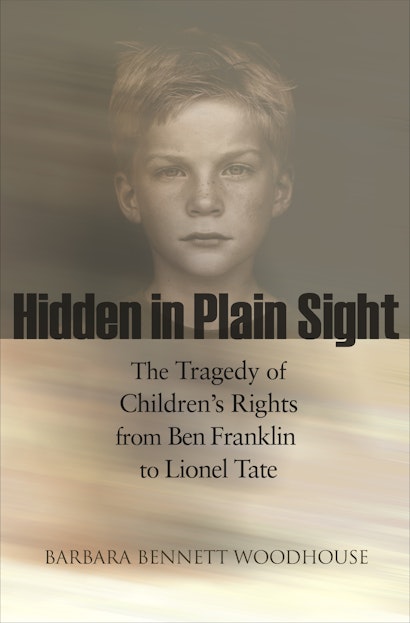Hidden in Plain Sight tells the tragic untold story of children’s rights in America. It asks why the United States today, alone among nations, rejects the most universally embraced human-rights document in history, the United Nations Convention on the Rights of the Child. This book is a call to arms for America to again be a leader in human rights, and to join the rest of the civilized world in recognizing that the thirst for justice is not for adults alone.
Barbara Bennett Woodhouse explores the meaning of children’s rights throughout American history, interweaving the childhood stories of iconic figures such as Benjamin Franklin with those of children less known but no less courageous, like the heroic youngsters who marched for civil rights. How did America become a place where twelve-year-old Lionel Tate could be sentenced to life in prison without parole for the 1999 death of a young playmate? In answering questions like this, Woodhouse challenges those who misguidedly believe that America’s children already have more rights than they need, or that children’s rights pose a threat to parental autonomy or family values. She reveals why fundamental human rights and principles of dignity, equality, privacy, protection, and voice are essential to a child’s journey into adulthood, and why understanding rights for children leads to a better understanding of human rights for all.
Compassionate, wise, and deeply moving, Hidden in Plain Sight will force an examination of our national resistance—and moral responsibility—to recognize children’s rights.
Awards and Recognition
- Winner of the 2009 APSA's Best Book Award, Human Rights Section
"With this thoroughly annotated, well-written book, Woodhouse performs an admirable job in helping readers to understand the complicated and ambiguous issue of children's rights in the US. Documenting some of the most egregious examples of the abuse and neglect of children with stories both personal and universal, she leads readers down the historical trail of legislative and judicial decisions made on children's behalf, and suggests others ripe for the making."—J. C. Altman, Choice
"This book is timely. Hidden in Plain Sight: The Tragedy of Children's Rights . . . will serve as a guide for all professions involved with children. The author has provided a discussion of the elemental rights of children, using historical narratives to illustrate the presence and lack of rights afforded them. . . . It is an important book and hopefully will result in definitive guidelines that will include needs-based and capacity-based standards that the legal, economic, and psychosocial professions can apply in determining the best interests of children."—Viola Mecke, PsychCRITIQUES
"This is a substantive book from an academic perspective while maintaining a very readable dialogue. And for absolute certainty, wherever you stand or thought you stood on the issue of children's rights, once you have read this book, you will never look at a children's story the same again."—Elizabeth Falter, Nursing Administration Quarterly
"[Woodhouse] provides a narrative balanced with historical examples, including Anne Frank and the children of Dred Scott, as well as contemporary examples, like children of illegal immigrants, to explain the need for a defined structure of children's rights in the United States. Recognizing the ways that America has failed its children, Woodhouse advocates for a much-needed perspective and commitment when it comes to thinking about how we treat our country's most vulnerable youth. . . . As a founder and director of the Center on Children and Families at the University of Florida and the Chair in Family Law at the University of Florida Levin, Woodhouse is uniquely situated to write about advocating for children's rights."—Erika Asgiersson, Campus Progress.com
"This moving and highly readable book reflects Woodhouse's long career as a distinguished family-law scholar and her deep reflection on the position of children in law and policy. She brings us riveting stories about famous people who, as children, have made significant contributions in areas such as gender equality and civil rights. Woodhouse presents us with the original and compelling argument that children should also have rights, not because they are potential adults, but because of the agency, courage, and vision they can and do exercise as children."—Martha Albertson Fineman, Robert W. Woodruff Professor of Law, Emory University
"Woodhouse's superb, nuanced volume demonstrates the importance of treating children with dignity, shows the connection between children's needs and rights, and conveys how a developmentally based human rights framework can shape the balance between dependency and autonomy on the journey from childhood to adulthood."—Robert G. Schwartz, executive director of the Juvenile Law Center
"This is a wonderful book that essentially teaches us, through the eyes of a child, what it means to be an American—or at least what it should mean. Through profound and beautifully told stories of the experiences of youth, Professor Woodhouse provides new insight and 'a new conversation' about the misunderstood and improperly politicized concept of children's rights."—Marvin Ventrell, president and CEO of the National Association of Counsel for Children
"An intensely personal book, written with passion and conviction. Woodhouse does a highly effective job of conveying the importance of attending to children's voices and agency. This book is likely to attract public attention and spur public debate."—Steven Mintz, author of Huck's Raft: A History of American Childhood
"Woodhouse is a wise person of experience whose voice is an important one, because of her good sense, her compassion, and her well-earned reputation in the field. She is also an excellent writer who brings the law alive through her stories, and talks about important legal issues in language that all can understand."—Elizabeth Bartholet, author of Nobody's Children and Family Bonds

